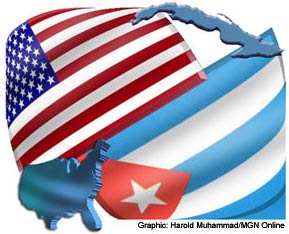Edited by Robin Silberman

“What is Cuba doing on a list of countries that sponsor and harbor terrorists, alongside Iran, Sudan and Syria?” asked Abraham Lowenthal, an academic renowned for his work on Latin America. In issues of national security, the professor told me, it is extremely dangerous to launch accusations that aren’t supported by facts, because this is how to undermine the credibility of the adopted [security] measures.
I agree with Lowenthal and think that his criticism deserves reflection. In practical terms, the inclusion of Cuba on the list of state sponsors of terrorism only means that travelers flying from the Caribbean island to the United States will be subject to a search and their luggage will be examined exhaustively. In a broader sense, however, this measure indicates the persistence of a serious anachronism in U.S. foreign policy.
Worse still, with the adoption of this measure, the U.S. State Department is comparing Cuba to Iran, Sudan, Syria, Afghanistan, Saudi Arabia, Algeria, Lebanon, Libya, Nigeria, Pakistan, Somalia and Yemen; countries that either sponsor terrorist groups or produced the fanatics that have attacked the United States.
Not to be confused, it is true that for the past half-century there has been an iron dictatorship in Cuba that violates the human and civil rights of its citizens; savagely represses, incarcerates, or exiles the opposition; and has driven the country to economic ruin, but no one has proven it to be a state sponsor of terrorism.
In the 1970s and ’80s, Cuba inspired, trained, and sponsored leftist guerrilla groups that engaged in armed struggles to attempt to oust right-wing democratic, autocratic, and dictatorial governments in various Latin American countries. It is also true that, around the same time, Fidel Castro sent Cuban troops to fight battles on the continent of Africa under the orders of its sponsor, the Soviet Union. It was precisely for this reason that the administration of Ronald Reagan decided to include Cuba on the State Department’s famous black list in 1982.
The United States government also accused Castro of maintaining contacts with Colombian guerrilla groups, like the ELN, until, ironically, the different Colombian administrations clarified that the link wasn’t only tolerated but encouraged by them to favor spaces for dialogue. Even today, the relationship between President Álvaro Uribe and the Cuban dictator continues to be a matter of mutual interest.
With things such as they are, one must ask why the United States continues to enforce this absurd policy toward a small island that has the same system of government as China, a country that Obama recently visited, and with which economic, commercial, and cultural exchanges increase every day.
The answer is obvious. Despite the fact that the ideas of the old guard of Cuban exile grow more obsolete every day for the new generations of young Americans of Cuban origin, and the fact that the majority of Americans are asking for a policy change, the great excess of Cuban-American lobbyists of the past continue to dictate U.S. policy toward Cuba.
And all this in spite of the fact that the only Cubans ever found guilty of having realized terrorist acts in Washington D.C. and various other countries organized in exile, principally in Florida, and that several of them had the support of the Central Intelligence Agency (CIA).
If Obama really wants to reinforce national security, reform the way intelligence agencies work, and recuperate coherence in the fight against international terrorism, he should now begin the legal procedure to erase Cuba from the list of state sponsors of terrorists. After all, the State Department’s own reports indicate that, since the 1990s, Cuba has actively stopped supporting armed struggles in Latin America and in every other part of the world.

Leave a Reply
You must be logged in to post a comment.